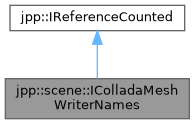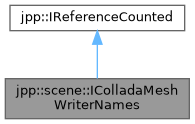 |
Jimcpp 2.1.0
Jimcpp is a high-performance c++ graphics engine.
|
 |
Jimcpp 2.1.0
Jimcpp is a high-performance c++ graphics engine.
|
Callback interface to use custom names on collada writing. More...
#include <jimcpp/core/engine/IColladaMeshWriter.hpp>


Public Member Functions | |
| virtual jpp::core::stringc | nameForMesh (const scene::IMesh *mesh, int instance)=0 |
| Return a unique name for the given mesh. | |
| virtual jpp::core::stringc | nameForNode (const scene::ISceneNode *node)=0 |
| Return a unique name for the given node. | |
| virtual jpp::core::stringc | nameForMaterial (const video::SMaterial &material, int materialId, const scene::IMesh *mesh, const scene::ISceneNode *node)=0 |
| Return a name for the material. | |
 Public Member Functions inherited from jpp::IReferenceCounted Public Member Functions inherited from jpp::IReferenceCounted | |
| IReferenceCounted () | |
| Constructor. | |
| virtual | ~IReferenceCounted () |
| Destructor. | |
| void | grab () const |
| Grabs the object. Increments the reference counter by one. | |
| bool | drop () const |
| Drops the object. Decrements the reference counter by one. | |
| s32 | getReferenceCount () const |
| Get the reference count. | |
| const c8 * | getDebugName () const |
| Returns the debug name of the object. | |
Additional Inherited Members | |
 Protected Member Functions inherited from jpp::IReferenceCounted Protected Member Functions inherited from jpp::IReferenceCounted | |
| void | setDebugName (const c8 *newName) |
| Sets the debug name of the object. | |
Callback interface to use custom names on collada writing.
You can either modify names and id's written to collada or you can use this interface to just find out which names are used on writing. Names are often used later as xs:anyURI, so avoid whitespace, '#' and '' in the names.
|
pure virtual |
Return a name for the material.
There is one material created in the writer for each unique name. So you can use this to control the number of materials which get written. For example Jimcpp does by default write one material for each material instanced by a node. So if you know that in your application material instances per node are identical between different nodes you can reduce the number of exported materials using that knowledge by using identical names for such shared materials. Names must follow the xs:NCName standard to be valid, you can run them through IColladaMeshWriter::toNCName to ensure that.
|
pure virtual |
Return a unique name for the given mesh.
Note that names really must be unique here per mesh-pointer, so mostly it's a good idea to return the nameForMesh from IColladaMeshWriter::getDefaultNameGenerator(). Also names must follow the xs:NCName standard to be valid, you can run them through IColladaMeshWriter::toNCName to ensure that.
| mesh | Pointer to the mesh which needs a name |
| instance | When E_COLLADA_GEOMETRY_WRITING is not ECGI_PER_MESH then several instances of the same mesh can be written and this counts them. |
|
pure virtual |
Return a unique name for the given node.
Note that names really must be unique here per node-pointer, so mostly it's a good idea to return the nameForNode from IColladaMeshWriter::getDefaultNameGenerator(). Also names must follow the xs:NCName standard to be valid, you can run them through IColladaMeshWriter::toNCName to ensure that.